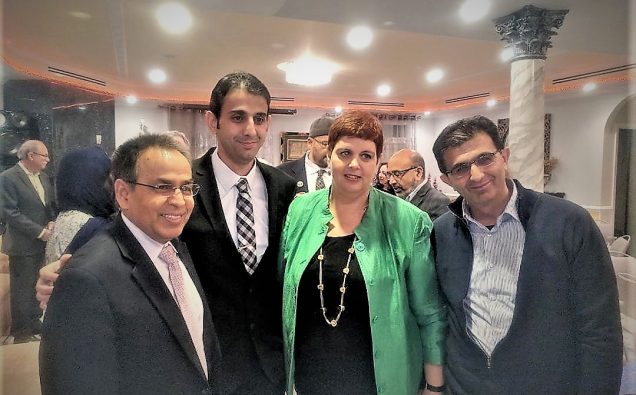
“In the sufferer, let me see only the human being,” Dr. Sargit Arbel Alon said as she emphasized the human connection that drives her work in the conflict zone.
Dr. Alon, an Israeli obstetrician and gynecologist, spoke along with Palestinian doctor Akram Amro, a Palestinian physiotherapist, at an event hosted by Pakistani-American dentist, Dr. Maqsood Chaudhry.
The two doctors visited Washington D.C. and other U.S. cities as part of their trip to garner support for the initiative called the Rozana Project that helps transport and treat critically-ill children from the West Bank and Gaza in Israeli hospitals.
The international project raises finances to training Palestinian doctors, nurses and therapists in Israel as part of its mission to realize healthcare in Palestinian communities.
Many around the world, who often hear news accounts of mayhem and the terrible loss of innocent lives in the longstanding Middle Eastern conflict, find it skeptical to learn that such an initiative is actually working on the ground.
But the doctors say Rozana project has already several stories to tell where the volunteers transported the ailing patients and medical staff treated them.
The project is named after a Palestinian girl Rozana Salawhi, whose story of survival in 2012 inspired volunteers on both sides to join humanitarian work to heal the wounded and the sick.
Rozana, who was four-year-old that year, sustained life-threatening injuries when she fell from the ninth floor of the family’s apartment in a village near Ramallah, the organization says. But her mother Maysa Abu Ghannam, a Palestinian journalist, showed remarkable determination to save her daughter when she took her to Hadassah Hospital in Jerusalem against all odds and got her treatment at the facility recognized as a world leader in pediatric emergency care.
Maysa was able to transport her daughter to the hospital through the Palestinian and Israeli ambulance services at the checkpoint and this way reminding the two sides of the possibility that exists for a “positive dialogue between ordinary Israelis and Palestinians.”
“Project Rozana didn’t bring the sides together or compel the Israelis to act. Nor did it bang heads in the Palestinian health system to accept an offer of help.
“What Project Rozana did was to open the curtain on an area of society that has for too long been closed. Shrill, uninformed voices of hate viewed any form of coexistence as a stunt or worse,” the organization says.
Welcoming the doctors and representatives of Jewish and Muslim organizations at his home, Dr. Maqsood Chaudhry echoed the message of interfaith harmony and the common ground that followers of the three Abrahamic faiths – Judaism, Christianity and Islam – can find to work together in the spirit of humanity and volunteerism.
Dr. Sultan Chaudhry, President McLean Islamic Center, also praised the spirit behind the joint effort that helps give treatment to patients and the wounded.
The event highlighted the message that “If We Save One Life, We Save the World,” and was supported by ADAMS Center, McLean Islamic Center and Masjid Muhammad), Washington Hebrew Congregation and Temple Rodef Shalom and interfaith organizations including Jews and Muslims and Allies Acting Together, Foundation for Ethnic Understanding and Rumi Forum for Interfaith Dialogue and Understanding and the Order of St. John.

















